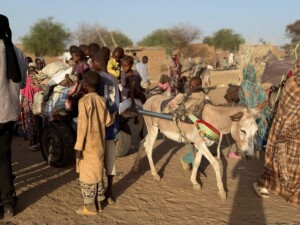Minister: Agreement on GERD essential to safety of Sudan population
Sudan’s Minister of Irrigation and Water Resources, Yasir Abbas, has underlined the necessity for Sudan, Egypt, and Ethiopia to reach a legal and binding agreement regarding the filling of the Grand Ethiopian Renaissance Dam (GERD), stressing that while Sudan still maintains its position on the benefits of dam, but warned that “the absence of specific and documented information about filling and operation [of the dam], will threaten the lives of half the population of Sudan”.
 Sudan’s Minister of Irrigation and Water Resources, Yasir Abbas (SUNA)
Sudan’s Minister of Irrigation and Water Resources, Yasir Abbas (SUNA)
Sudan’s Minister of Irrigation and Water Resources, Yasir Abbas, has underlined the necessity for Sudan, Egypt, and Ethiopia to reach a legal and binding agreement regarding the filling of the Grand Ethiopian Renaissance Dam (GERD), stressing that while Sudan still maintains its position on the benefits of dam, but warned that “the absence of specific and documented information about filling and operation [of the dam], will threaten the lives of half the population of Sudan”.
Speaking at a press conference regarding Ethiopia’s unilateral second filling of the GERD in Khartoum yesterday, Minister Abbas stressed that while negotiation is the best solution to reach a binding legal agreement regarding the filling and operation of the GERD, “Sudan is not ready to enter into negotiations with the same methodology as before, because it means buying time,” and “Sudan fully believes that the only solution in the file of the Renaissance Dam is through serious negotiation that preserves the interests of the three countries”.
Abbas underlined that access to transparent, accurate information and data on the filling and operation of the dam is essential for the Ministry to be able to forecast floods and to help other sectors to take precautions. Access to the information, “is a legal right and not a grant, according to the international Law of Transient Waters”. The information is essential to maintain the safety of the Sudanese dam system from Roseires to Khartoum and Atbara.
‘The absence of specific and documented information about filling and operation of the GERD, will threaten the lives of half the population of Sudan…’
However, he said that the information and data achieved by the technical team at Sudan’s Ministry of Irrigation and Water Resources is better than the information sent by the Ethiopian Prime Minister to Sudan on the second filling. Abbas argues: “The exchange of information between Sudan and Ethiopia will not affect the operation of the dam, and will not pose a threat to progress of the construction”.

He pointed out that the Ethiopian Minister of Irrigation and Electricity stated in his message to Sudan on July 5 that Ethiopia will reserve 13.5 billion cubic meters, while the total stored water in the Renaissance Dam’s Lake in the current year was four billion cubic meters.
The Minister of Irrigation explained that while the GERD benefits Sudan in the field of electricity generation, reducing floods and silting, and operation of the Roseires dam, “provided that there is a legally binding agreement and the exchange of information and data,” noting that “the lack of agreement on filling and operation of the Renaissance Dam threatens half of Sudan’s population”.
Abbas indicated that the failure of previous negotiations to reach an agreement led Sudan to address the UN Security Council, as the sitting was held at the request of Sudan on June 21 and was supported by Egypt on June 25, explaining that the insistence for holding serious negotiations “aims to preserve the rights of everyone but not to waste time, especially that 90 per cent of the technical items had been reached, and the remaining is 10 per cent, represented the legal issues”.
Controversies
The dam, Ethiopia’s intention to fill it, and the ramifications to Sudan and Egypt downstream have been the subject of sharp and often fruitless negotiations, which are now progressing due to international efforts at mediation.
In May, 22 NGOs warned of military confrontations between the three countries if the long-running dispute between the governments of Ethiopia, Sudan, and Egypt over the building, filling, and operating of the GERD is not resolved quickly.
“The project is expected to have profound effects on the future of the three countries and the African sub-region. While it represents an important development opportunity for Ethiopia as its prime owner, the impact of GERD on Sudan and Egypt cannot be overlooked”, their statement read.
* Ethiopia began to build the GERD in 2011 at the source of the Blue Nile, near the border with Sudan, and the dam is currently in the final phase of construction. In August last year, Addis Ababa unilaterally began filling the dam reservoir.
The Blue Nile contributes approximately 85 per cent to the volume of the main Nile River. Both Egypt and Sudan heavily depend on the waters of the Nile to meet the demands of their growing populations.
The three countries signed a Declaration of Principles in Khartoum in 2015 as a basis for negotiations, but no agreement on the use of the Nile waters has been reached so far. More than once, negotiations under the auspices of the Africa Union ended in a deadlock. Recently, the EU and the USA have both expressed their willingness to mediate between the three countries.











 and then
and then